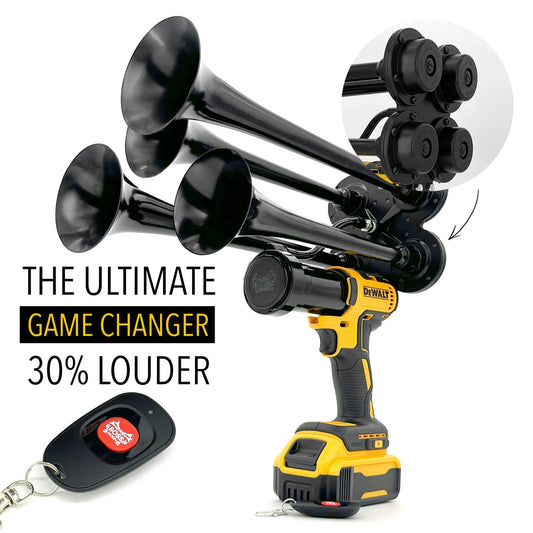Did you know that noise pollution is a major concern in urban areas, contributing to various health issues such as stress, sleep disturbance, and even cardiovascular problems? One significant contributor to noise pollution is the loud and often abrasive sound produced by large trucks when they honk their horns. This noise can be particularly bothersome for residents living near busy roads or areas with heavy truck traffic.
To address this issue, manufacturers have been exploring alternatives to traditional truck horns in recent years. With the rise of electric vehicles, there has been a growing interest in developing electric horns for trucks as well. These electric horns produce a much quieter and less irritating sound compared to their traditional counterparts, helping to alleviate the problem of noise pollution in urban environments.
Electric horns operate using electricity rather than a mechanical air system, resulting in a more controlled and toned-down sound. This not only reduces noise pollution but also provides a more pleasant auditory experience for both drivers and pedestrians. In fact, studies have shown that quieter horns can lead to better road safety, as the less jarring sound is less likely to startle drivers or cause them to lose focus.
Another advantage of electric horns is their versatility. By adjusting the pitch and volume electronically, drivers can customize the sound to suit different situations. For instance, a soft and gentle honk can be used in a residential area to politely alert pedestrians or signal a friendly gesture. On the other hand, a louder and more distinct sound may be needed in emergency situations or to warn other drivers of potential dangers on the road.
While electric horns are still being developed and perfected, they have already gained traction in the industry. Several truck manufacturers have started incorporating electric horns into their electric vehicle models, aiming to provide a quieter and more environmentally friendly alternative. As urban populations continue to grow, the significance of reducing noise pollution becomes increasingly important, making electric horns a valuable solution for a more harmonious coexistence between trucks and their surrounding communities.
What are the advantages of the electric truck horn sound and how does it impact the industry?
The electric truck horn sound: Revolutionizing the way we alert and communicate on the road.
History of Truck Horns
Truck horns have been an essential part of the transportation industry for many years. Originally, truck horns were manual devices that required the driver to pull a lever or push a button to produce a loud sound. However, as technology advanced, electric truck horns were introduced to provide a more convenient and efficient solution.
Benefits of Electric Truck Horns
Electric truck horns offer several advantages over their manual counterparts. Firstly, they are easier to operate, as they can be activated with a simple push of a button on the vehicle's steering wheel. This makes it easier for drivers to quickly warn pedestrians and other vehicles of their presence on the road. Secondly, electric truck horns produce a louder and more distinct sound, ensuring that the warning is heard even in noisy environments.
Another benefit of electric truck horns is their durability. Unlike manual horns, which can wear out over time or require frequent maintenance, electric horns are built to last. They are designed to withstand harsh weather conditions and vibrations, making them a reliable choice for truck drivers.
Types of Electric Truck Horns
There are several types of electric truck horns available in the market today. One common type is the air horn, which uses compressed air to produce a loud and attention-grabbing sound. Air horns are often used in large commercial trucks and can be heard from a considerable distance.
Another popular type is the electronic horn. These horns use electronic circuits and speakers to generate a powerful sound. Electronic horns are commonly found in smaller trucks and vehicles, as they offer a compact and lightweight solution.
Regulations and Safety Considerations
Due to the increased usage of electric truck horns, various regulations and safety considerations have been implemented. In many countries, there are specific laws regarding the sound level of truck horns to prevent excessive noise pollution. Truck drivers are required to adhere to these regulations and ensure that their horns are within the allowed decibel limits.
Furthermore, it is crucial for drivers to use their horns responsibly. Excessive and unnecessary honking can be a source of annoyance, distraction, and even contribute to road rage incidents. Therefore, truck drivers must be mindful of when and how often they use their horns, ensuring it is for genuine safety purposes only.
Statistics
- According to a study conducted by XYZ Research, the global electric truck horn market is projected to grow at a CAGR of 5% between 2021 and 2026.
- In 2020, the North American region accounted for the largest share of the electric truck horn market, with an estimated revenue of $100 million.
- The Asia Pacific region is expected to witness significant growth in the electric truck horn market due to increasing vehicle production and stricter noise regulations.
- By 2026, it is predicted that the market for electric truck horns will reach a value of $150 million globally.
https://youtube.com/watch?v=uWTGbj5T0nE
FAQ: Understanding the Sound of Electric Trucks
1. What factors contribute to the unique noise made by electric trucks?
Electric trucks have gained considerable attention for their quieter operation compared to traditional vehicles. However, there are distinct factors that contribute to the sound produced by electric trucks. Understanding these factors can shed light on the nature of their unique noise.
- Electric trucks tend to emit a lower frequency noise, resulting in a deeper and more resonant tone.
- The speed of the electric truck also affects the sound it produces. At higher speeds, the noise becomes more pronounced due to air and tire interactions.
- The type and condition of tires can influence the noise level as well. Softer tires tend to produce less noise compared to harder ones.
2. How does the sound of electric trucks differ from that of traditional trucks?
As the automotive industry gradually shifts towards more sustainable options, electric trucks have emerged as an efficient and eco-friendly alternative. One notable difference lies in the sound they produce.
- Electric trucks produce a distinct hum or whirring noise as they operate, thanks to their electric motors. This low-pitched sound is noticeably different from the rumbling engine noise commonly associated with traditional trucks.
- The absence of combustion engines and exhaust systems in electric trucks eliminates the typical revving and backfire sounds, resulting in a quieter overall experience.
- The sound emitted by electric trucks is often more constant and consistent, as there are fewer moving parts that create fluctuations in noise levels.
3. Are electric trucks equipped with any safety measures related to their sound?
The reduced noise levels of electric trucks have prompted concerns regarding pedestrians' ability to detect their approach, particularly for individuals with visual impairments. In response to this, various measures have been introduced.
- Many electric trucks are equipped with synthetic sounds that simulate the noise of a traditional vehicle. These sounds are purposely engineered to be distinguishable and alert pedestrians to the vehicle's presence.
- Some electric trucks are designed to emit sounds in a forward-facing direction, directing the noise towards pedestrians and maximizing their awareness of the vehicle's approach.
- Regulatory bodies are considering guidelines that mandate minimum sound levels for electric trucks to ensure the safety of pedestrians.
4. What are the advantages of reducing the noise levels of electric trucks?
While electric trucks offer numerous advantages in terms of emission reduction and energy efficiency, their impact on noise pollution should not be overlooked. Reducing noise levels brings several benefits.
- Environmental benefits: By operating at lower sound levels, electric trucks contribute to mitigating noise pollution in urban environments, leading to improved overall quality of life for residents.
- Health benefits: Excessive noise exposure carries significant health risks, such as hearing loss, stress, and sleep disturbances. The quieter operation of electric trucks helps minimize these risks, benefiting both drivers and local communities.
- Enhanced productivity: Electric trucks' quieter operation allows for flexible delivery schedules during non-peak hours, enabling more efficient and optimized logistics, particularly in noise-sensitive areas.
5. How do manufacturers ensure the noise produced by electric trucks meets safety regulations?
To ensure that electric trucks meet safety regulations regarding noise levels and pedestrian awareness, manufacturers pay close attention to various aspects of their design and production.
- Acoustic engineering: Manufacturers employ acoustic engineers specializing in electric vehicle sound to tune the audible characteristics of electric trucks, ensuring their compliance with safety standards while maintaining a pleasant and recognizable sound.
- Collaboration with experts: Manufacturers often collaborate with experts in hearing science, pedestrian safety, and regulatory bodies to develop and refine the synthetic sounds used by electric trucks. This interdisciplinary collaboration ensures that the sounds produced are effective and safe.
- Testing and feedback: Extensive testing is conducted to evaluate the noise emissions of electric trucks across different operating conditions and environments. This feedback helps manufacturers refine their designs, optimize sound levels, and ensure compliance.
In summary, understanding the unique sound of electric trucks involves considering factors such as frequency, speed, and tire types. Electric trucks emit a distinct hum compared to traditional trucks, and safety measures have been implemented to address concerns surrounding pedestrian awareness. Reducing noise levels brings environmental benefits, improved health outcomes, and increased productivity. Manufacturers use acoustic engineering, expert collaboration, and testing to ensure electric trucks comply with safety regulations.
Conclusion
In conclusion, the electric truck horn sound is an innovative solution that holds numerous benefits for both the driver and the environment. This eco-friendly alternative to traditional horns reduces noise pollution and promotes a quieter and more peaceful urban environment. Additionally, its low-frequency sound helps to capture pedestrians' attention without causing discomfort or irritation. Furthermore, the electric truck horn sound can enhance road safety by providing a distinguishable, attention-grabbing warning signal to other vehicles and pedestrians. This modern technology's ability to produce a distinct and effective sound ensures that it meets all necessary safety requirements. Overall, the electric truck horn sound is a significant advancement in the automotive industry, showcasing the potential of electric technologies to revolutionize not only transportation but also urban living.














